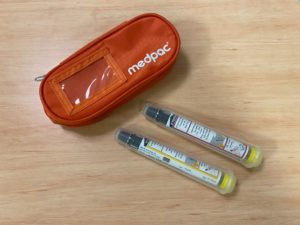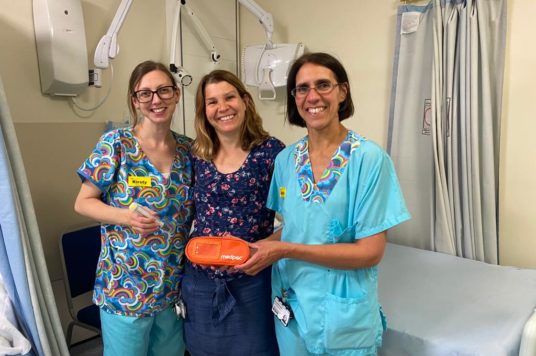St George’s keeps allergic children safe with national first emergency allergy bag scheme
A life-saving scheme providing adrenaline autoinjectors – or ‘EpiPens’ – to 140 primary and secondary schools in south London is the first of its kind in the UK.
In addition to launching the emergency bags, St George’s doctors and nurses are urging parents of children with allergies to remember to provide schools with their allergy management plan and emergency medications.
The emergency allergy bag scheme, set up by St George’s Hospital’s paediatric allergy team, is on hand if someone with known allergies has a reaction and their adrenaline auto-injector is unavailable or expired, or if someone experiences an allergic reaction who was not known to have allergies. This provides children, parents and schools with an additional layer of protection and reassurance.
Local parents, Matt and Sally Walker, are thankful for the scheme for raising awareness of the severity of food allergies as their teenage son, 15-year-old Charlie, has an allergy to peanuts and soya protein.
Matt said: “As a parent of a child with life threatening food allergies it’s a constant worry and we have had several events where Charlie has needed quick intervention, but it is a great reassurance that St George’s has put this programme in place in local schools.
“Having the allergy emergency bags containing spare adrenaline devices and training all staff how to spot signs of serious allergic reactions and how to administer EpiPens, will save lives! I am very grateful to St George’s for raising awareness of the severity of food allergies.”
Charlie added: “As someone who has had several allergic reactions and has been lucky enough to be treated at school, I know first-hand how valuable this knowledge and resource is. Allergic reactions can vary so much, and food labelling and serving staff information isn’t always quite as obvious or good as it should be.”
St George’s is the one of the largest paediatric allergy centres in London and receives approximately 1,200 new patient referrals every year, while its children’s services overall are rated outstanding by the CQC. In the UK, up to 40% of children have an allergic condition, with the four most common conditions being food allergy, eczema, asthma and hay fever, according to Allergy UK.
The emergency allergy bag
The St George’s team set the emergency allergy bag scheme up in response to two deaths in north London schools in 2016 in which the Coroner concluded that, in both cases, there had been failure to recognise anaphylaxis, a delay in treatment of the reactions and problems with the storage and monitoring of emergency medications.
Legislation to allow schools to purchase spare adrenaline autoinjectors has been in place since 2017. However, a local survey performed by St George’s in 2019, found that only a third of schools had purchased spare adrenaline autoinjectors, the storage and management of allergy medications were not meeting guidelines and the training of staff was inadequate.
Dr Rosy Wells, Consultant in Paediatric Allergy Medicine at St George’s and Project Lead, said: “The emergency allergy bags and training sessions for staff members and school nurses are designed to ensure that if a child suffers from a severe allergic reaction at school, the staff are able to recognise the reaction and have the skills and medication to treat anaphylaxis until the paramedics arrive.
“Allergies are a cause of significant anxiety for a food allergic child and their parents or guardians and can have a huge impact on their quality of life. The scheme provides reassurance to children and their parents that school staff are regularly trained and that emergency adrenaline autoinjectors are available if needed. It also created increased awareness about food allergies and anaphylaxis in schools for everyone.”
A survey completed by schools within the scheme found that 100% of respondents felt the emergency allergy bags and training should be made available to all schools nationally.
The bags are replaced and refresher training is delivered annually to school first aiders and nursing teams. Training sessions are recorded and have been viewed more than 700 times since the scheme was rolled out in September 2020.
Dr Richard Jennings, Group Chief Medical Officer for St George’s, Epsom and St Helier University Hospitals and Health Group, said: “This scheme shows the very best of St George’s working together with our local community to provide outstanding care. Our teams recognised an issue and have worked with local schools to take an innovative approach which offers not only children with allergies and their parents or guardians reassurance, but also provides reassurance through training for school staff. We are extremely proud of the way we and our local schools have been able to work together to develop and provide this care.”
The paediatric allergy team at St George’s worked alongside hospital and community pharmacists and CCGs to develop and deliver emergency allergy bags along with training to all state schools in Wandsworth and Merton. The initiative took inspiration from within the respiratory paediatric team at St George’s who rolled out London’s first asthma bag scheme to the same group of schools in 2019. As with the asthma bags, the allergy bag scheme has been funded by Wandsworth and Merton CCGs.
Notes to editors
For photos or interviews, please contact communications@stgeorges.nhs.uk
Photo: Dr Rosy Wells (centre) is a consultant in paediatric allergy medicine, Kirsty (left) and Sarita (right) are paediatric allergy clinical nurse specialists.
About St George’s
St George’s children’s services are rated outstanding by the CQC.
Every year St George’s treats over 130,000 children and deliver 5000 babies.
St George’s University Hospitals NHS Foundation Trust is the largest healthcare provider, major teaching hospital and tertiary centre for southwest London, Surrey and beyond – and one of the largest healthcare providers in the UK – serving a population of 3.5 million.
Its main site, St George’s Hospital – one of the country’s principal teaching hospitals – is shared with St George’s, University of London, which trains medical students and carries out advanced medical research.
St George’s is one of 11 adult and children major trauma centres in the UK, one of eight hyper acute stroke units and one of the biggest and busiest of the eight heart attack centres in London.
St George’s is the only hospital site in London where children with cancer can receive oncology surgery, PICU and neurosurgery as well as oncology care all on the same site with the other specialties that are required as well.



